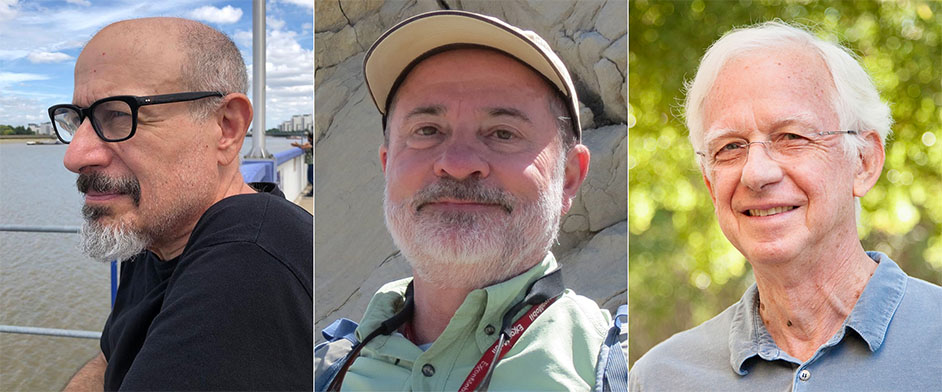Castagna, Rudolph and Suppe Offer Expertise while Fostering Collaboration in Geology, Geophysics
Each year, the American Association of Petroleum Geologists (AAPG) picks an elite group of geology scholars to share their ideas and expertise as part of its Distinguished Lecture Program.
For 2023–2024, three Department of Earth and Atmospheric Sciences faculty at the University of Houston were chosen to participate.
John Castagna, Kurt Rudolph and John Suppe will serve as speakers for the AAPG Distinguished Lecture Program. This recognition highlights their contributions to the field and the UH College of Natural Sciences and Mathematics’ commitment to excellence in geology education and research.

While EAS faculty have held this honor in previous years, the selection of three faculty in one year is a first for the department.
The Distinguished Lecture Program includes recorded presentations that can be streamed or downloaded. Speakers also give in-person or live virtual presentations.
These lectures allow professionals and students to engage with cutting-edge research. They also foster collaboration and the exchange of ideas within the petroleum geology community.
Castagna: Beyond Physics in Geophysics
Castagna, UH professor of geophysics and the Margaret S. and Robert E. Sheriff Endowed Faculty Chair in applied seismology, is known for his groundbreaking work in seismic petrophysics. He has been a trailblazer in advancing the understanding of subsurface formations.
“As a geophysicist having a research interest in bridging the gap in perspective between geologists and geophysicists, I was very pleased to be nominated as a distinguished lecturer,” said Castagna.
Castagna’s presentation breaks down geophysics by looking at the individual roles physics and geology both play, along with the promising role of machine learning in this area of research. This is Castagna’s second time to serve as a contributor.
Rudolph: Sedimentary Basin Response to Mountain Building
Rudolph, adjunct professor of petroleum geology, is a leading authority in sequence stratigraphy and sedimentary basin evolution. He worked for 37 years in the energy industry, retiring in 2015 as chief geoscientist for ExxonMobil.
“My primary talk explores the sedimentary basin response to Paleozoic mountain building events in North America, including the Appalachian, Ouachita, Ancestral Rocky Mountain and Antler orogenies,” said Rudolph.
His lecture offers valuable insights on the interaction between tectonics and sedimentation, including petroleum system elements. Like Castagna, this is Rudolph’s second opportunity to serve as a speaker.
Suppe: Crustal Strength and Deformation
Suppe, a distinguished professor of geology, brings a wealth of expertise to the program. With a career marked by seminal contributions to the understanding of tectonics and faulting, Suppe's studies delve into the complexities of geological structures and their implications for resource exploration. He and his students made key contributions to fault-related folding, growth strata, mechanics of thrust belts, pore-fluid pressures, and state of stress in cooperation with numerous petroleum companies.
“I’m looking forward to giving a talk that highlights some industry-academy synergies dealing with the strength of the Earth’s crust, including some going back before my time,” said Suppe.
The lecture Suppe curated for the program elaborates on the strength and deformation of the earth’s crust and what can be learned from active fault systems, boreholes, earthquakes and toy models.
Prior to joining UH in 2016, Suppe was a professor of geology at Princeton University. Additionally, he was a visiting professor at National Taiwan University, Caltech, University of Barcelona, Nanjing University and Ludwig Maximillian University of Munich. In 2007, he moved to Taipei and joined National Taiwan University as Distinguished Chair Research Professor.
- Chris Guillory, College of Natural Sciences and Mathematics